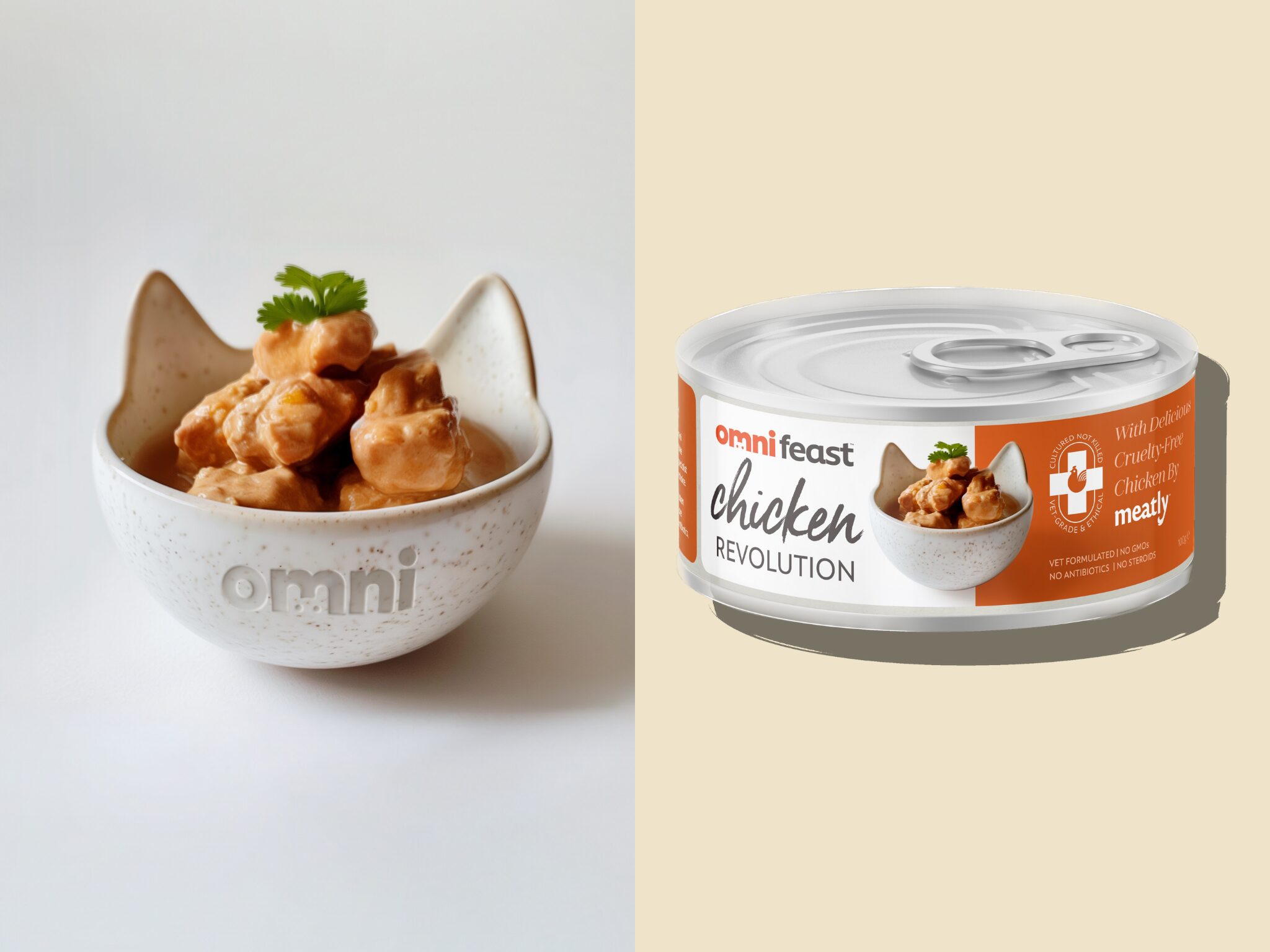UK Regulatory Approval for Cultivated Meat Looms with New Proposed Rules, As Meatly Expects Greenlight for Pet Food Within 3 Months
6 Mins Read
Meatly, the British startup making cultivated meat for pets, has indicated that it expects to get the regulatory greenlight to sell its cat food within three months, which would make it the first company in the sector to go to market in the UK.
With plans to launch its first cultivated meat product – tinned chicken for cats – this year, Meatly suggests it will get the go-ahead from the UK’s regulator in the next three months, according to the Times.
Meatly completed the first production run of its canned pet food earlier this month, which combines its cultivated chicken with pulses and vegetables by vegan dog food company OMNI to form what founder and CEO Owen Ensor called a chicken pâté.
The 2022-launched company’s cultivated chicken is created by “taking a sample of cells from a chicken egg just once”. Formerly known as Good Dog Food, it rebranded late last year ahead of its planned market launch, and to reflect the diversification of its portfolio from dog food to products for cats as well.
The announcement comes just as the Food Standards Agency (FSA) published plans to fast-track the market entry of novel foods like cultivated meat, which are currently subjected to pre-Brexit laws inherited from the EU. The regulatory body and the UK government have faced criticism for being too slow to capitalise on post-Brexit freedom in this area, with companies currently having to wait about two-and-a-half years for a resolution on their application.
“We have an opportunity for the UK, now that it does not come under EU regulation, to create a system that is more streamlined and more efficient. But safety is and always will be our number one priority,” Rebecca Sudworth, policy director at the FSA, told the Grocer.
Regulatory greenlight easier for pets than humans

Meatly had already announced its intention to go to market in 2024, with Ensor previously stating: “We need cultivated meat now more than ever. Pet food is the natural starting point, given consumers’ excitement. We’re thrilled to be at the heart of the future of meat production in the UK.”
He noted that while pets love meat, “old-fashioned meat – produced through factory farming – requires a huge amount of land, water and antibiotics and is a key cause of environmental degradation”. The startup’s research has suggested that pets account for 22% of the UK’s meat consumption – that’s more than what British children eat every year.
The 150g cat food tins will cost about £1 each, and have been taste-tested by both Ensor and his rescue cats, Lamu and Zanzi, who are said to have enjoyed the product. While cats are seen as obligate carnivores, research has shown that alternative diets including vegetarian or vegan food can be just as healthy – if not healthier – as a meat-based one. Study lead professor Andrew Knight argued that biologically, cats need a specific set of nutrients (protein, taurine, and vitamins A and B12, for example), not meat, and these can be introduced via plant-based supplements.
Meat-based cat food can require added supplements too. “There’s no scientific reason why you can’t supply all the necessary nutrients through plant additives,” Knight told the Guardian. “Modern vegan diets produced by pet food companies use plant, mineral and synthetic sources to supply all needed nutrients. They also lack hazards such as animal-sourced allergens that occur within meat-based pet food.”
Cultivated meat is, of course, not vegan, but actually serves as an alternative option for cat owners unconvinced by the research into meatless diets for cats. “This is a natural starting point for cultivated meat because at the moment, consumers are more willing to give this to their pets than eat it themselves,” Ensor told the Times.
The advantage that cultivated pet food has over cell-cultured meat for humans is that the former doesn’t need to adhere to textural parity with conventional meat. “Pets care what food smells like and they care what it tastes like, and if it has the right nutrients,” he explained. “But they don’t particularly care what it looks like or if it has the right kind of texture.”
Having raised £3.5M in seed funding last year, the company has secured “key partnerships with manufacturers”, including with petcare retailer Pets at Home (which invested in the round), whose commercial director David Wainwright said: “We are committed to helping drive change in the industry and finding sustainable alternatives to replace some of the protein used globally in pet food would be a major step forward.”
FSA aims to speed up cultivated meat regulatory process

Meatly isn’t the only company making cultivated meat for pets. It’s a space that includes Austria’s BioCraft Pet Nutrition (which makes mouse meat), US-based Marina Cat (producer of the world’s first cultivated fish for cats), California’s Wild Earth (which works on cultivated dog food), and Czech startup Bene Meat (which has developed cultivated beef for pets).
The latter, in fact, became the first company to list its cultivated cells in the EU Feed Materials Register, which allows it to produce and sell cultivated meat for pet food. However, this is separate from the robust EU novel foods regulations for cultivated meat, as animal feed materials do not require premarket approval.
With its market launch plans for the UK, which has so far retained the EU rules post-Brexit, Ensor laid out Meatly’s hopes to be the first company to sell cultivated meat in Europe. Jim Melon, executive director of Agronomics (which partly owns Meatly), has previously said that it would be easier to earn regulatory approval for cultivated meat for pets than humans.
Sudworth told the Times it would take at least two years to greenlight cultivated meat for human consumption in the UK, even if the FSA’s new proposed plans to speed up the process are accepted. “For something that is new, which nobody has ever eaten before, we have to get the risk assessment right,” she said.
The proposals would enable the FSA to use the approval of food safety bodies in other countries as a benchmark to escape the EU’s “bureaucracy”, and slash regulations affecting thousands of products, including animal feed and human food, according to the Grocer. The FSA and Food Standards Scotland will formulate plans for a network of internal collaborators, which would allow them to use their decision on food safety as grounds for products coming to market in the UK.
The plans will also do away with the requirement for already approved products to reapply for clearance every 10 years, as well as the need for the parliament to pass statutory instruments for products, which can add up to six months to the process.
And last month, the FSA announced it was seeking government funding for safety testing labs for cultivated meat via a £5M scheme announced by UK chancellor Jeremy Hunt last autumn. It is already in talks with food companies and has issued a call for scientists to pilot a ‘sandbox’ testing project starting this autumn, which will enable them to assess the novel proteins for human consumption.
Israeli cultivated meat producer Aleph Farms was the first to file a dossier for the approval of its cultivated beef in the UK last August. In January, the startup’s product was cleared for sale in its home country, and would hope for a similar outcome in the UK with the attempts to fast-track this process.
Ensor echoed that sentiment for his own company, saying: “I would very much hope that we would have this on sale this year.”



